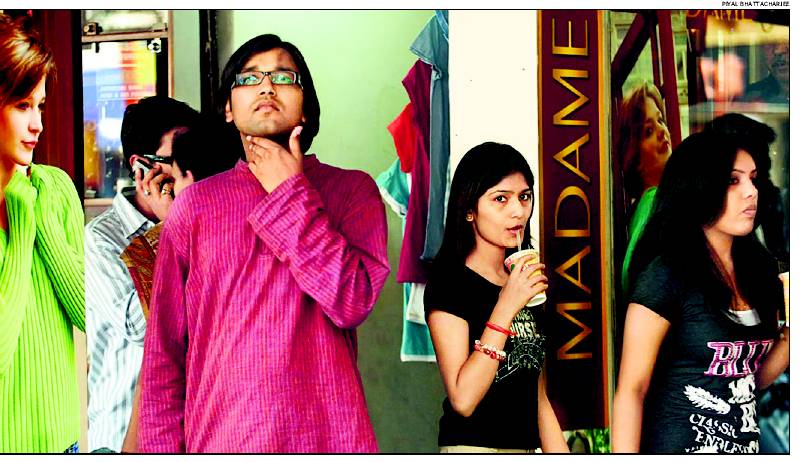|
MALE BONDING
When a man
stops loving
Unable to
bear the demands of the modern woman, an increasing number of
Indian men are making the dramatic decision of banning romance
from their lives. They are instead paying for love in erotic
lands. Agniva Banerjee on a disturbing trend
Empowered women and men who pretend to be fair have erected a
global concentration camp of political correctness that has left
the average male depersonalised, bitter and even deformed. Look
around honestly. The 21st century man is right there laughing like
a jackass at the Hugh Grant matinée. He shares the kitchen sink
chores at home and changes nappies. He has been domesticated after
being lured into marriage by something called love. It is in
reaction to this decimation of the natural male, this creation of
a comical character called a good modern husband, that an
increasing number of boys and men are rejecting romance all
together. No more wooing the average girl in the office,
succumbing to her good words, then putting up with her inevitable
tantrums. Not when they have discovered ways of satiating their
carnal needs — exotic sex lands and high-end prostitutes. One may
think it is all too simplistic. But that’s what the male brain
ranging from Albert Einstein’s to Salman Khan’s has always craved
for — simplicity of theory.
Shashwat Srivastava, a 27-year-old advertising professional
from Delhi, is one such male who believes in hard work, hard cash,
and holidays in Thailand, Amsterdam and Rio. He says with the
excitement of a new convert, “Earlier, I would meet a pretty girl
in the office and try to strike up a conversation. It would take
considerable effort to cut through her airs and graces and get
talking. The topic of the conversation would be a pain to me, but
I would pretend to enjoy every moment. After a few days she would
be ready to go out for coffee. This would be followed by a
mind-numbing movie. Then another round of coffee. A month would
have passed by now. I would still be in hot pursuit. A few
weekends later would come the big day for dinner. After the dinner
I would, chivalrously, drop her home. And the next day, just when
I would expect my big moment to come, I would find her chatting
animatedly with the idiot from marketing. What a waste of effort.”
But success in love brings a new set of obstacles. “Many a
times you do succeed. And you also end up making love. But then,
very quickly, you also fall out of love and start fancying other
girls. And then it gets damn difficult to break free from the
woman,” says Soumik Naskar, an 18-year-old undergraduate student
of information technology at the Government Engineering College,
Kalyani, West Bengal. “It’s being unfair to the woman. You know
you are in it for sex. So why keep up the pretence? Why not go
straight for the nookie by paying for it?”
Ramesh Kaul, a 45-year-old Delhi-based marketing consultant,
says about the sudden spurt in men being Bohemian instead of
proper, “It’s a healthy thing. For as little as 50,000 bucks, you
can have a fun weekend in Southeast Asia. Many of my close friends
are doing that.”
The new experiment of Indian men with breaking away from
social norms and finding love in the commercial place is at a
higher state of evolution in the First World. According to a
report which appeared in the British Medical Journal in 2005, the
percentage of British men who paid for sex had increased from 5.6
in 1990 to 9 in 2000. But the element of surprise lay in the
details. It was not just the fat slob, the sex worker’s client
stereotype, who was visiting brothels. The study found an
increasing number of successful, attractive men in their
mid-twenties to mid-thirties opting to pay for intimacy.
Clare Spurrell, a reporter for The Times of London,
interviewed some of these men wondering why “the sort of young man
of whom most mothers would approve”, paid for sex. “It is
difficult for a woman to understand what it is that a prostitute
can offer these perfectly attractive men that a free sexual
encounter cannot,” Spurrell wrote. The answer Spurrell got was
obvious — “lack of any emotional obligation”.
“It’s happening in the vicinity,” says 41-year-old Vijay
Swami, a senior vice-president of a communications agency in
Mumbai. “Conversations with friends and acquaintances reveal that
quite a few of them are paying for sex.” Ramesh Kaul says that a
trend may have started in which men are no longer interested in
the women around them. “Flirting used to be and still is the norm
when it comes to interaction between men and women at the
workplace. But in my previous organisation there was this guy who
just did not interact with the women apart from in a strictly
professional capacity. I found his behaviour a bit odd. It emerged
gradually that he believed in hard work and earning good money; he
did not believe in asking women out, in forging relationships or
in love. He preferred chasing exotica. He would go on planned sex
tours abroad.” The number of such men, though small today in
India, is on the rise according to the observations of regular
men.
Radical feminists call the phenomenon a systemic
“objectification” of women. But is this objectification really so
repulsive to women? Could it be that love was always some sort of
a material transaction between a man and a woman? Shekhar Verma, a
student of advertising and public relations at the Indian
Institute of Mass Communication, New Delhi, says, “In my
institute, the boys are out to get the prettiest girls, while the
girls are out to get the guys with the best bikes, best mobiles
and rich dads. And there’s no such thing as love. So if some men
have stopped being hypocritical, what’s wrong with it?”
The tragedy is, says Srivastava, “that though men appreciate
the needs of women, women don’t of men. They expect us to listen
to and understand everything they say, but don’t realise they are
driving us crazy. Women simply rob you of your happiness. So why
shouldn’t men make the dealing straight?” The view of Srivastava,
as offensive as it might be to women, is a very common view that
most men keep hearing all the time from their friends.
Even among men who like relationships with regular women,
there is now a rise in the lure of brothels. That is tied to
another fundamental male need — variety. One must understand that
being respectable was not, at any point in human history, a
fervent male wish. Now men are encashing in on the liberal times.
Marita McCabe, one of the psychologists who conducted a study
in Australia in 2000, concluded that men visit sex workers, “not
only for sexual activities that their partners do not provide, but
also to fulfil certain psychological needs, such as the need for
intimacy and excitement.”
Even as an increasing number of men are dismissing monogamy as
an unnatural societal condition, what is interesting is that they
are conducting this rejection not with any nebulous guilt, but
with the conviction of a virtuous ascetic. As Kaul says, “When my
son grows up, I will expect him to have fun too.” TNN

|





